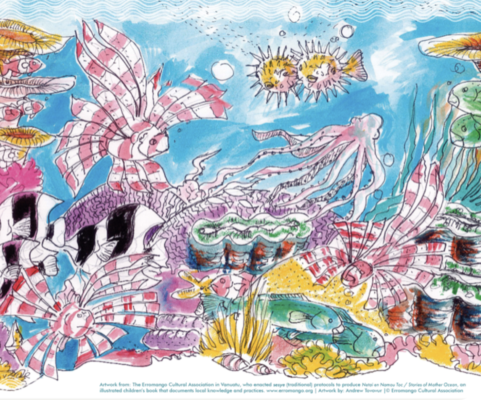Partnering with UN-Human Rights at the 12th Asia-Pacific Forum on Sustainable Development

“The human right to a healthy environment, which includes a healthy ocean, helps to ensure that no one is left behind in ocean governance”. This was a key message explored at a side event titled “Upholding the Human Right to a Clean, Healthy, and Sustainable Ocean” at the 12th Asia-Pacific Forum on Sustainable Development in Bangkok in February 2025.

The One Ocean Hub was invited by the UN Human Rights Office for South-East Asia to co-organise this event in partnership with United Nations Economic Commission for Asia-Pacific and India Water Foundation.

Photo courtesy: OHCHR South-East Asia
The event shed light on the severe impact of climate change on Indigenous Peoples, coastal communities, and small-scale fisherfolk. It stressed the importance of respecting Indigenous Peoples’ rights, Free, Prior, and Informed Consent (FPIC), and ensuring their meaningful participation in marine conservation efforts. Panelists also shared examples of the human rights impact of ocean industries like large-scale fisheries, aquaculture, offshore oil and gas, renewable energy, and tourism. They highlighted the crucial role of human rights due diligence for businesses, and the need for the private sector to co-develop initiatives with ocean-dependent communities and local knowledge holders.
Hub Director Elisa Morgera stated: “The human right to a healthy environment, which includes a healthy ocean, helps to ensure that all the connections between a healthy ocean and human well-being are considered in decision-making. It also ensures that businesses involved in the blue economy and a just transition act responsibly, through clear policies on their human rights responsibilities, due diligence procedures, grievance, and remediation.”
The Asia-Pacific Forum on Sustainable Development (APFSD) is an annual, intergovernmental forum that supports the follow-up and review of progress on the 2030 Agenda for Sustainable Development and the SDGs at the regional level. The Forum brings together United Nations system bodies, member states, international organizations, civil society, and other stakeholders whose reflections feed into and inform the 2025 High-level Political Forum in New York, which reviews sustainable development progress at the global level. This year, in alignment with the focus of the 2025 HLPF, the Forum assessed progress on the SDGs under review: Goal 3 (good health and well-being); 5 (gender equality); 8 (decent work and economic growth); 14 (life below water).

Photo credit: Romchat Wachirarattanakornkul
At the APFSD Forum, Elisa Morgera, as UN Special Rapporteur on Climate Change and Human Rights, also contributed to the SDG 14 roundtable, which provided an opportunity for representatives from governments and local authorities, civil society, academia, youth, and the private sector to review the progress on SDG 14 in the Asia-Pacific region and associated challenges, and to discuss priorities for action. Respecting the human right to a healthy environment and operationalizing a gender-responsive, human rights-based approach to marine and coastal biodiversity, including by co-developing solutions with women and children, were among the priority areas identified by participants attending the roundtable. Lastly, the UN Special Rapporteur on Climate Change and Human delivered a statement at the APFSD Plenary session AGENDA ITEM 4: Review of regional progress and opportunities for achieving the SDGs.
“Ocean action is also climate action; and climate finance should also be ocean finance for ocean-based climate actions that protect human rights and the benefits that marine biodiversity provides to humanity’s well-being,” she highlighted.